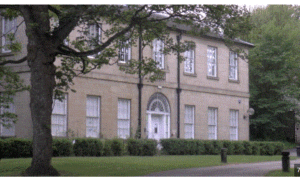
Havelock Square: Broomhall, Anarchy and The Commune
Broom Hall is a historic house in the heart of Broomhall, from which the neighbourhood derives its name. The
house’s origins can be traced back to the 15th century, including timber framing and a tree-ring from 1498, when it
was owned by the Wickersley family. The family had lived in Wickersley, a small village near Rotherham in South
Yorkshire, since the 12th century, and it was unclear when their relationship to Sheffield and Broom Hall initially
developed.
In the 16th century, Robert Swift, son of Rotherham, married Ellen, daughter and heir of Nichloas Wickersley, who
owned Broomhall and other Wickersley estates. Richard Jessop married Anne, Robert Swift’s eldest daughter, and
the home passed to them after his death. A deed from 1561 states that the estate at Broomhall was granted to the
Jessops.
 Under the Jessop family the house was extended. James Wigfull attributes to William Jessop (d. 1630) the erection
Under the Jessop family the house was extended. James Wigfull attributes to William Jessop (d. 1630) the erection
of the H-shaped house, extending the western wing, while other sections of the house were rebuilt in the late
17th century, while the eastern wing was added in 1784 by the Rev. James Wilkinson, Vicar of Sheffield and
descendant of the Jessop family from his maternal ancestors.
During the time Rev. James Wilkinson lived in Broom Hall, the house was attacked and set on fire by a mob during
the famous Broomhall Riots, in 1791, against the Enclosure of land Act, resulting in the damage of the library
collected by Mr. Wilkinson’s great-grandfather, Francis Jessop, one of the earliest members of the Royal Society, as
well as part of the furniture and windows. On his will, dated on 1801, Rev. James Wilkinson left Broom Hall to his
cousin, Philip Gell of Hopton who sold a great part of his property, with Broom Hall being bought by Mr. John
Watson of Shirecliffe Hall.
In the mid-19th century, the house was divided into three tenancies until 1973, when it was restored and became the
home and workshop of renowned Sheffield-born cutlery designer David Mellor, who received an Architectural
Heritage Award. Broom Hall has been turned into offices since 1990, and it is a Grade II listed building.
The excellent integration of the cutlery workshops earned an Architectural Heritage Year award.
Read more news on https://sportupdates.co.uk/

Leave a Reply